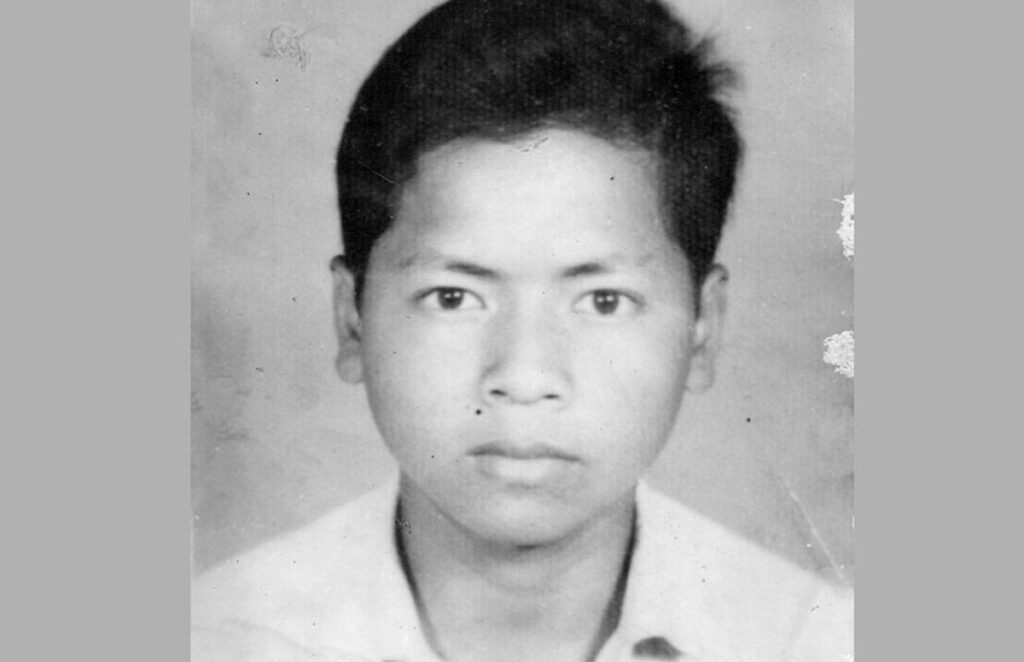Five of my ten children died during the Khmer Rouge regime. My two oldest boys, Muon and Mut, were executed. My third son, Ty, starved to death, as did his sister Chrip and my youngest son Aun, who died when he was only a year old. I didn’t know how to get food for my children at that time; all I was able to find were palm and bamboo shoots.
I grew up in the Dangkor District of Phnom Penh. Our family was poor, but my husband was very poor. He came to work at our house, helping in the rice fields. My family noticed that he was hard working, so I agreed to the marriage they arranged for us. He always tied his karma at the waist, never at the neck, which was considered to be rude to the elderly. In order to marry me, my family asked the groom’s side to build a house for us as a dowry. It cost 3,000 riels; both of our families shared the costs equally. My husband was an orphan, so the neighbors felt sorry for him and gave more wedding gifts to his side than mine. We had our wedding reception on mats because we couldn’t afford tables, but we did have traditional music and gas lamps. After the wedding, my husband worked as a blacksmith and farmer. I was at home looking after the children.
Our son Muon was a gentle man with beautiful dark skin. He was even taller than his father. Whenever I gave him pocket money, he gave it to the poor. At first, he was a village healer, but then he studied hard and became a nurse.
Mon married a farmer named Yin Sokh Khoeun. As his mother, I arranged their marriage. After their wedding, they lived with both our family and hers. They had a middle-class life because he worked in a hospital.
When the Khmer Rouge took over Phnom Penh, they tied red karma on their guns and around their necks. We were all very scared of the Angkar and knew we must leave as they told us. Muon, his wife and her family were with us. They had one small daughter at that time, and his wife was pregnant.
Along the road, the Khmer Rouge soldiers said that they were taking us to meet the Angkar. We kept asking them where the Angkar lived. They said we would meet the Angkar once we reached our destination. Although we journeyed far, we still could not find the Angkar.
When we reached Bratheat pagoda, we built a hut to live in. Then the cadres announced that they needed a blacksmith, so my husband was selected. I gave birth shortly after that. The only people there to help me were my neighbors who were evacuated with us. A year later, my little son died of starvation because my body didn’t produce enough milk for him.
I missed my other children who were working in a mobile brigade, so I went to visit them. But when my children saw me, they cried and walked away. I didn’t understand this. Later, their unit chief sent me for re-education. “Hey, grandma,” he said, “Do you know that the Angkar has meetings for mothers who are desperate to see their children and complain about it?”
At the end of 1975, the cadres asked about our family’s past. I was honest and told them my husband was a blacksmith and my son Muon was a nurse at a Phnom Penh hospital. Two weeks later, the Angkar ordered Muon to chop down bamboo trees. He went away by cow cart and disappeared. His wife kept waiting for him, but he never came back home. Then her child became sick and died in the hospital from starvation.
The Angkar kept coming to ask me if I missed my son. I told them I didn’t miss him because the Angkar would support my son well wherever he lived. If had I said I missed him, I would have been killed.
I still miss Muon and my feelings are unstable because I could not cry for him when he was taken away. My son strived for life, but the Angkar killed him. Every time there is an observance of Buddhist percepts, I dedicate my prayers to him.

